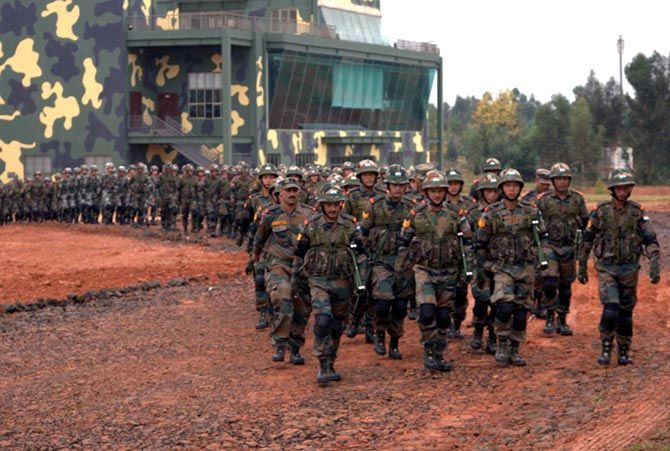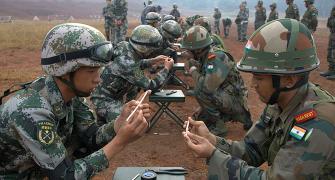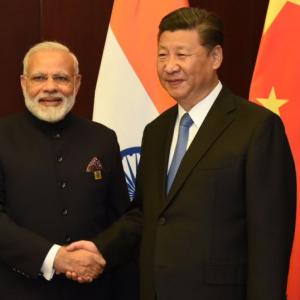'Little did those in India's strategic community realise that any wise adversary in China's place and circumstances would only take the land route to disturb and trouble India.'
'It is along the land border that all of India's post-Cold War allies would be of little or no political and diplomatic, and least of all, military help,' says N Sathiya Moorthy.

Now that dust seems to be slowly settling on the Doklam issue, it may be time for India and Indians to sit up and reverse gears to study the Chinese intentions more seriously than our talk show pundits and social media experts have done thus far.
This is because, after Doklam, China has already commenced firing exercises inside Tibet.
With Doklam, they have already flagged Bhutan's security at India, and alongside they also brought Sikkim into focus.
Translated on the ground, India now has to commit forces to/in Bhutan and along the Sikkim border. This can interfere with our strategic planning and military preparations, including any 'Cold Start' of a kind.
With Pakistan already a taunting neighbour, this means that India will have disturbing thoughts about our long land borders even without anyone firing any shot.
If it did come to shots, then it is a different ball game altogether.
In military terms, it could mean more preparations, and possibly more procurement than already.
Our supplier nations, mostly the West these days, should be happier for it than already. Economically it could prove disastrous than already for India.
Still, China would not have fired a shot yet -- and possibly so, Pakistan, too. Such a course could be worse than Pakistan's 'war of a thousand cuts'.
Independent of the Indian position and decision, if in the midst of the Doklam tensions China offered to mediate between India and Pakistan, it was/is not without their own 'reasons' and/or 'justification'.
Given that China is in adverse possession of Indian land in PoK, any negotiated settlement of the border dispute with one of them would have to involve the other, at some stage.
If serious about it, Chinese interlocutors may have told their Indian counterparts about this part of the border negotiations, long ago. If so, their foreign ministry spokesman's recent statement on mediating/facilitating India-Pakistan should not surprise anyone in the Indian establishment.
Back in April 2005 in Bengaluru, then Chinese premier Wen Jiabao gave expression to Beijing's 'vision' of the unfolding 'Asian Century', thus: 'India's software skills combined with China's dominance in hardware can ... take the leadership position in the world.'
Wen was referring only to technology, especially the IT sector, but the larger Chinese perspective was not missed.
Possibly for the first time after the 1962 War, a top Chinese leader visited TCS and other software companies in the Garden City. He was also taken on a tour of ISRO, India's prestigious State-run space organisation.
Yet, only months after the Wen visit, India went ahead and signed the first major, post-Cold War 'defence treaty' with the US that very year.
Not only Beijing, but even Moscow viewed the secrecy surrounding the signing of the US defence treaty with discomfort, if not disdain.
The annual India-US Malabar naval exercises with Japan joining in more recent years -- with Australia wanting to sign in too -- has not gone down well with China.
However, China does not talk about the 'String of Pearls' and the more recent Belt and Road Initiative in the same vein.
Instead, China continues to indicate that Malabar is an outright military exercise and that the world, especially India, has to believe Beijing's monotonic proclamation of good intentions and economic reasoning purportedly attending on the String and BRI.
Leaving aside Chinese claims to the contrary and Indian domestic perceptions which is at exact variance, the question arises if BRI-linked Chinese 'business interests' and 'Third World development agenda' are only a trial balloon ahead of Doklam.
True, Doklam was not in the news at the time, but Arunachal Pradesh was for long in and out of Indian media attention over concerns of Chinese incursions and claims.
Taken to the logical conclusion, BRI-centric Chinese incursions started long ago with PoK and China-built roads, then Gwadar and then revived claims on Arunachal and now reviving Doklam, Sikkim, and adding BRI.
Some of these issues belong to the Cold War, when India was no friend of the US. Others are of more recent origin.
Malabar is unacceptable to China, as Beijing is far from becoming an ocean power capable of challenging the all-American might.
By flagging the 'China bogey', the US has also roped in China's adversarial neighbours like India, Japan and Vietnam. Australia is an add-on of sorts as it does not have any border or other issues and disputes with China.
If the String of Pearls brought India closer to the US, particularly on the military and naval fronts even when Wen Jiabao was talking about a software-hardware driven 'global leadership position', Beijing also did not seek to allay legitimate Indian fears, anxieties and apprehensions in any meaningful way.
It is thus anybody's guess why China did not invite India to join the String of Pearls then as it belatedly did in the case of BRI now, knowing full well its potential for fresh doubts in and trouble with India even at the time.
China has taken Indians, if not India, by surprise by flagging Doklam and Sikkim, and at the same time.
Indians, especially those in the strategic community, have been speaking too much and for too long about Indian naval might which, of course, has vastly improved over the past decade and more.
Little did they realise, or acknowledge, that any wise adversary in China's place and circumstances would only take the land route to disturb and trouble India. (This is what I had said elsewhere, just weeks earlier.
It is along the land border that all of India's post-Cold War allies would be of little or no political and diplomatic, and least of all, military help, unless China is ready for a naval battle.
Without naval allies to call its own, China is unlikely try that route until it is ready for it, if at all.
It is true that China is only aping the West, especially the US, on a variety of fronts.
That way, if the US can become a superpower militarily, and across oceans, there is no question why China cannot become one in its time.
Of course, China's long-term objective would be to arrive there without having to 'out-source' its anticipated geostrategic concerns, where India and Japan, Australia and NATO all fit into the American scheme -- or, so in the possible Chinese perception.
Indians can go to war with China on social media if and when the government wants us to, but fighting a non-war on social media can only raise temperatures and consequent expectations from the government.
Considerable provocation and little proactive Indian response on the ground, which is only the fair thing to expect under the circumstances, can only push the political leadership to the wall.
In an electoral democracy, it means a lot. For China, where the 19th Communist party congress in November is expected anoint President Xi Jinping as the 'core leader', it means much less -- unless their leadership actually joins a war and loses it.
N Sathiya Moorthy, veteran journalist and political analyst, is Director, Observer Research Foundation, Chennai Chapter.










